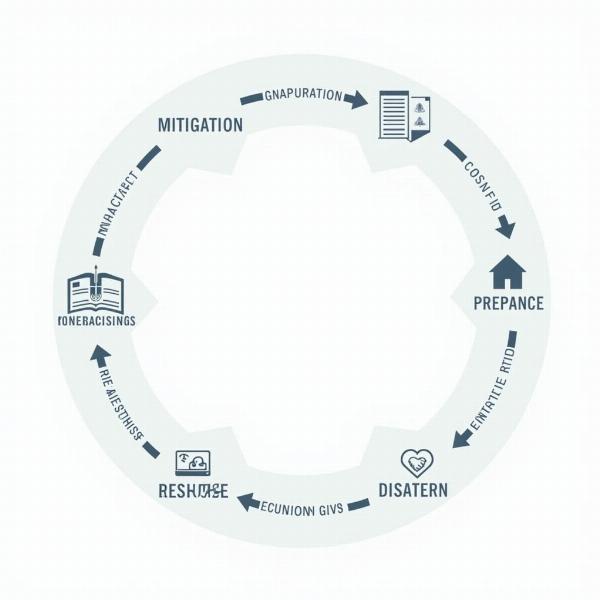Disaster management, a crucial aspect of modern governance, aims to mitigate the impact of natural and man-made calamities. Understanding its meaning and implications is particularly important in India, a nation vulnerable to diverse hazards. This article explores the meaning of “disaster management” in Hindi, delving into its various components and significance within the Indian context.
What is the Meaning of Disaster Management in Hindi?
Disaster management translates to “आपदा प्रबंधन” (aapada prabandhan) in Hindi. “Aapada” (आपदा) signifies disaster or calamity, while “prabandhan” (प्रबंधन) means management or administration. Therefore, “aapada prabandhan” encompasses the systematic process of preparing for, responding to, and recovering from disasters. This involves a multifaceted approach incorporating various strategies to minimize loss of life, property damage, and social disruption.
Key Components of Aapada Prabandhan (आपदा प्रबंधन)
Effective disaster management involves a cyclical process encompassing several key stages:
- Mitigation (शमन – Shaman): Reducing the risk of disasters by implementing preventive measures. This could include building codes, land-use planning, and environmental protection.
- Preparedness (तैयारी – Taiyari): Developing plans and procedures for responding to disasters. This includes establishing early warning systems, training personnel, and stockpiling essential supplies. buffer stock meaning in hindi can be crucial in this stage.
- Response (प्रतिक्रिया – Pratikriya): Providing immediate assistance to those affected by a disaster. This involves search and rescue operations, medical care, and the distribution of food, water, and shelter.
- Recovery (पुनर्प्राप्ति – Punarprapti): Rebuilding and restoring affected communities after a disaster. This includes repairing infrastructure, providing economic assistance, and supporting psychosocial recovery. Understanding the anumandal meaning in hindi can be helpful for targeted recovery efforts.
 Components of Disaster Management
Components of Disaster Management
Disaster Management in the Indian Context
India, with its diverse geography and climate, is highly prone to natural disasters such as floods, droughts, earthquakes, and cyclones. moderate rainfall meaning in hindi is contrasted with heavy rainfall that can lead to floods. The country also faces the threat of man-made disasters like industrial accidents and terrorist attacks. Therefore, effective disaster management is paramount to minimizing the impact of these events. The meaning of embankment in hindi is particularly relevant for flood control.
What are the Challenges in Disaster Management?
Disaster management in India faces several challenges, including:
- Population density: High population density in many areas exacerbates the impact of disasters.
- Poverty: Poverty and inequality increase vulnerability to disasters.
- Lack of awareness: Lack of awareness and education about disaster preparedness can hinder effective response.
- Climate Change: Increasing frequency and intensity of extreme weather events due to climate change pose a growing threat. ativrishti meaning in hindi highlights the increasing concerns related to excessive rainfall and its consequences.
Conclusion
Understanding the meaning of disaster management – “आपदा प्रबंधन” (aapada prabandhan) – is crucial for building a more resilient India. By implementing effective mitigation, preparedness, response, and recovery strategies, the nation can better protect its citizens and minimize the devastating impact of disasters.
FAQ
- What is the full form of NDMA? The full form of NDMA is the National Disaster Management Authority.
- What is the role of the government in disaster management? The government plays a crucial role in developing policies, coordinating relief efforts, and providing financial assistance.
- How can I contribute to disaster management? You can contribute by volunteering with disaster relief organizations, donating to relief funds, and spreading awareness about disaster preparedness.
- What are some common types of disasters in India? Floods, droughts, earthquakes, cyclones, and landslides are common disasters in India.
- What is the importance of early warning systems? Early warning systems provide crucial time for people to evacuate and prepare, minimizing the loss of life.
- What is the role of technology in disaster management? Technology plays a vital role in monitoring weather patterns, disseminating information, and coordinating rescue efforts.
- How can communities build resilience to disasters? Communities can build resilience by developing disaster preparedness plans, strengthening infrastructure, and promoting community-based disaster management.
Meaning-Hindi.in is your trusted partner for high-quality Hindi translation and language services. We offer a comprehensive range of solutions, from business and legal document translation to technical, website, and academic translation. Our expertise covers various sectors, ensuring accurate and culturally sensitive translations for all your needs. Contact us today for a free quote and experience the Meaning-Hindi.in difference! Email: [email protected], Phone: +91 11-4502-7584.